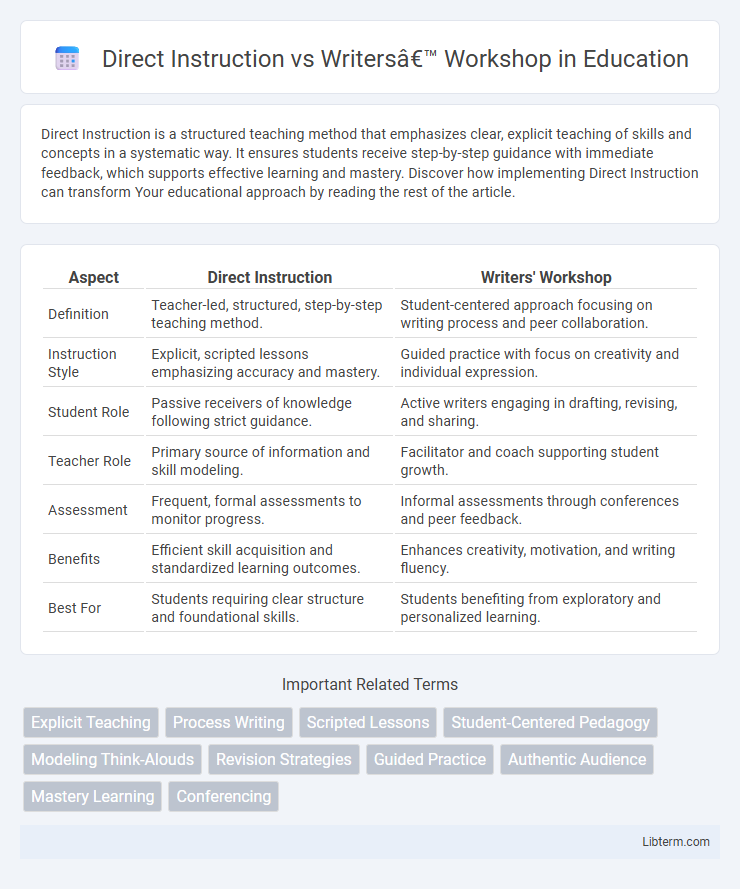Direct Instruction is a structured teaching method that emphasizes clear, explicit teaching of skills and concepts in a systematic way. It ensures students receive step-by-step guidance with immediate feedback, which supports effective learning and mastery. Discover how implementing Direct Instruction can transform Your educational approach by reading the rest of the article.
Table of Comparison
| Aspect | Direct Instruction | Writers' Workshop |
|---|---|---|
| Definition | Teacher-led, structured, step-by-step teaching method. | Student-centered approach focusing on writing process and peer collaboration. |
| Instruction Style | Explicit, scripted lessons emphasizing accuracy and mastery. | Guided practice with focus on creativity and individual expression. |
| Student Role | Passive receivers of knowledge following strict guidance. | Active writers engaging in drafting, revising, and sharing. |
| Teacher Role | Primary source of information and skill modeling. | Facilitator and coach supporting student growth. |
| Assessment | Frequent, formal assessments to monitor progress. | Informal assessments through conferences and peer feedback. |
| Benefits | Efficient skill acquisition and standardized learning outcomes. | Enhances creativity, motivation, and writing fluency. |
| Best For | Students requiring clear structure and foundational skills. | Students benefiting from exploratory and personalized learning. |
Overview of Direct Instruction and Writers’ Workshop
Direct Instruction is a teacher-centered approach emphasizing explicit teaching through scripted lessons, fast-paced drills, and immediate feedback to ensure mastery of specific skills and content. Writers' Workshop adopts a student-centered model that encourages independent writing, creativity, and peer collaboration, using mini-lessons to guide skill development within authentic writing experiences. Both methods aim to enhance literacy but differ significantly in structure, with Direct Instruction focusing on systematic skill acquisition and Writers' Workshop promoting self-expression and process-oriented learning.
Core Principles of Direct Instruction
Direct Instruction emphasizes highly structured, scripted lessons with clear, measurable objectives and immediate feedback to ensure mastery of specific skills. This method relies on explicit teaching, guided practice, and frequent assessments to monitor student progress and adjust instruction accordingly. Core principles include fast-paced instruction, teacher-led delivery, and systematic sequencing of concepts to promote efficient learning outcomes.
Foundations of Writers’ Workshop
The Foundations of Writers' Workshop emphasize student choice, authentic writing experiences, and ongoing assessment through conferring, fostering independence and creativity. Direct Instruction centers on systematic teaching of writing skills and strategies using explicit, teacher-led lessons to build foundational skills efficiently. Writers' Workshop encourages a balanced approach where mini-lessons introduce targeted skills followed by sustained writing time and personalized feedback to support skill development.
Key Differences in Teaching Approaches
Direct Instruction employs a structured, teacher-led approach emphasizing explicit teaching of specific skills and frequent teacher-student interaction, whereas Writers' Workshop centers on student choice, creativity, and process, fostering independent writing through guided practice and peer feedback. In Direct Instruction, lessons follow a clear, scripted sequence to build foundational skills quickly, while Writers' Workshop encourages exploration, revision, and personalized writing development over time. The effectiveness of Direct Instruction is measurable through immediate skill acquisition, while Writers' Workshop prioritizes long-term growth in writing fluency and self-expression.
Student Engagement and Participation
Direct Instruction emphasizes structured lessons with clear objectives, leading to high levels of student engagement through guided practice and immediate feedback. Writers' Workshop fosters active participation by allowing students to choose topics, collaborate, and receive peer reviews, enhancing intrinsic motivation and personalized learning. Research indicates that combining explicit teaching with opportunities for creative expression maximizes overall student involvement and investment in writing tasks.
Assessment Methods Compared
Direct Instruction uses frequent, structured assessments such as quizzes and standardized tests to measure student progress and ensure mastery of specific skills. Writers' Workshop emphasizes formative assessments through peer reviews, teacher conferences, and portfolio evaluations to gauge writing development and personalized growth. Both methods provide critical feedback but differ in the formality and frequency of their assessment practices.
Impact on Writing Outcomes
Direct Instruction emphasizes structured, explicit teaching methods that significantly improve students' grammar, sentence construction, and overall writing mechanics, resulting in measurable gains in standardized writing assessments. Writers' Workshop fosters creativity and individual voice through student-centered, process-oriented learning, enhancing narrative quality and engagement but yielding more variable performance on formal writing evaluations. Integrating the rigorous skill-building of Direct Instruction with the expressive freedom of Writers' Workshop often produces the strongest writing outcomes across diverse student populations.
Teacher’s Role in Each Model
In Direct Instruction, the teacher serves as the primary source of knowledge, delivering explicit, structured lessons with clear objectives and continuous monitoring of student progress to ensure mastery. In contrast, the Writers' Workshop model positions the teacher as a facilitator and mentor, guiding students through the writing process with individualized feedback, promoting independence and creativity. These distinct roles reflect the structured, teacher-led approach of Direct Instruction versus the student-centered, collaborative environment of Writers' Workshop.
Advantages and Limitations
Direct Instruction offers structured, teacher-led guidance that ensures consistent skill acquisition and immediate feedback, benefiting students who thrive in clear, step-by-step learning environments. Writers' Workshop promotes creativity and self-expression through student-centered, flexible writing tasks, enhancing motivation and authentic engagement but may challenge learners needing explicit direction. Limitations of Direct Instruction include reduced opportunities for creative exploration, while Writers' Workshop may result in uneven skill development without targeted instruction.
Choosing the Right Approach for Your Classroom
Direct Instruction provides structured, teacher-led lessons emphasizing clear, sequential skill development, ideal for classrooms needing consistent reinforcement and measurable outcomes. Writers' Workshop fosters student autonomy and creativity through a flexible, peer-supported environment encouraging individualized expression and growth. Selecting the right approach depends on your students' needs, classroom dynamics, and curriculum goals, balancing explicit skill teaching with opportunities for exploration and self-directed learning.
Direct Instruction Infographic

 libterm.com
libterm.com